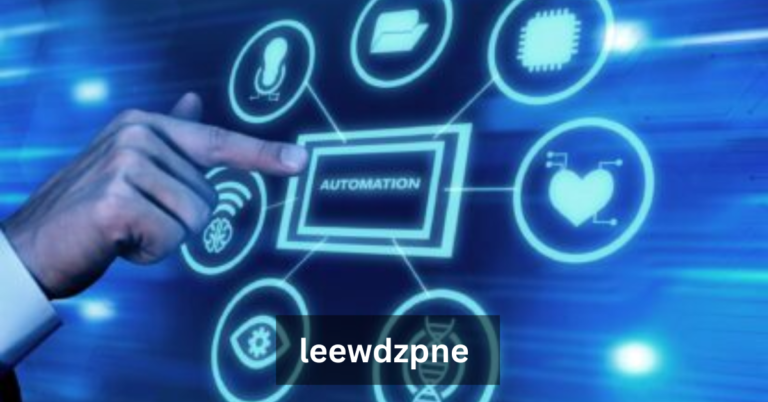l_mbsau_e: The Role of AI in Operational Success
l_mbsau_e refers to the integration of advanced technologies like AI, machine learning, automation, and smart systems to optimize business operations, enhance productivity, and foster innovation. At its core, l_mbsau_e is about creating AI-driven systems that optimize processes across various sectors, pushing companies toward digital transformation and reshaping industries in profound ways.
The importance of l_mbsau_e for modern industries cannot be overstated. With the rise of technologies like quantum computing, AI, and machine learning, businesses can now make faster, more accurate decisions, enhance customer experiences, and optimize resource management. AI-powered automation and cloud-based systems are becoming essential for organizations seeking a competitive edge. These advancements have revolutionized industries, from healthcare to retail, and their influence is set to grow exponentially in the coming years.
In this blog, we will explore how l_mbsau_e is transforming industries, the key technologies driving this change, the benefits and challenges of its adoption, and real-world case studies. We’ll also discuss the future of AI, automation, and other technologies under the umbrella of l_mbsau_e, offering actionable insights on how businesses can implement these advancements to stay ahead in a digital-first world.
Understanding the Core Concepts of l_mbsau_e
Key Technologies Driving l_mbsau_e
l_mbsau_e is powered by a combination of technologies that work together to streamline business operations and foster innovation. Let’s break down these key components:
AI and Machine Learning
Artificial Intelligence (AI) is the backbone of l_mbsau_e, enabling systems to perform tasks that typically require human intelligence, such as data analysis solutions, real-time data analytics, and decision-making. Machine learning algorithms further enhance this capability by learning from historical data and continuously improving performance over time. This makes AI-driven systems smarter and more efficient, improving business intelligence integration across industries.
Quantum Computing
Quantum computing is a revolutionary technology that promises to change how data is processed. By using quantum bits (qubits), it can solve complex problems much faster than traditional computers. For industries, this means data analysis solutions that are faster and more accurate, enabling better decision-making and more efficient operations. As quantum computing continues to develop, it will play a critical role in the evolution of l_mbsau_e.
Automation and Robotics
Automation is at the heart of l_mbsau_e, helping businesses improve their operations and reduce costs. Robotics and AI automation in industries streamline repetitive tasks, enhance production efficiency, and reduce human error. This allows companies to scale operations without increasing overhead costs and maintain a competitive advantage.
Smart Technologies (IoT, AR, VR)
Smart technologies, such as the Internet of Things (IoT), augmented reality (AR), and virtual reality (VR), are increasingly being integrated into industries to optimize operations. For example, IoT applications allow businesses to collect real-time data from connected devices, which can then be used to improve performance and create more efficient workflows. Similarly, AR and VR are being used in industries like retail and healthcare to enhance customer experiences and support training programs.
How l_mbsau_e Improves Operational Efficiency
One of the primary advantages of l_mbsau_e is its ability to improve operational efficiency across industries. By integrating AI-driven systems, cloud computing, and automation tools, businesses can optimize workflows, reduce human error, and enhance accuracy.
Operational Optimization
Incorporating AI and machine learning tools into business operations leads to faster decision-making and a more streamlined workflow. Cloud-based systems allow for more flexible and scalable operations, meaning businesses can manage their resources more effectively. This operational optimization is essential for staying competitive in today’s fast-paced market.
Real-Time Data Analytics
Data-driven decision-making is another crucial benefit of l_mbsau_e. By leveraging real-time data analytics powered by AI, businesses can gain insights into performance metrics, customer behavior, and market trends. These insights help in making informed decisions that enhance operational efficiency and drive profitability.
The Role of l_mbsau_e Across Different Industries
Healthcare: Revolutionizing Patient Care with AI
In healthcare, AI-powered solutions are transforming patient care. IBM Watson Health, for example, is using AI in healthcare to analyze medical records, assist in diagnostics, and provide personalized treatment plans. AI in healthcare enhances efficiency in healthcare systems, allowing healthcare providers to deliver better care while optimizing their resources.
Finance: Enhancing Risk Management and Fraud Detection
In the finance sector, AI-powered fraud detection systems are becoming increasingly common. These systems analyze financial transactions in real-time and flag suspicious activity, minimizing the risk of fraud. Furthermore, AI-driven risk management tools help financial institutions make more accurate predictions and optimize their investment strategies.
Education: AI-Powered Adaptive Learning Systems
In the education sector, adaptive learning platforms powered by AI are reshaping how students learn. These platforms personalize learning experiences, adjusting content based on individual progress and needs. By integrating AI and machine learning, educational institutions can enhance student engagement and improve learning outcomes.
Manufacturing and Supply Chain: Optimizing Production with Automation
The manufacturing industry is increasingly adopting AI and automation to streamline production processes and reduce operational costs. Smart infrastructure in business, such as IoT-enabled devices and automated robots, allows manufacturers to monitor equipment in real-time, reducing downtime and improving efficiency.
Retail: Personalized Customer Experiences
Retail businesses are using AI-powered business intelligence to offer personalized shopping experiences. Through data analysis solutions, retailers can recommend products to customers based on their previous purchases and browsing behavior. This improves customer satisfaction while driving sales.
The Benefits of Implementing l_mbsau_e
Increased Operational Efficiency
The integration of AI, machine learning, and automation into business processes significantly enhances operational efficiency. These technologies help reduce human error, automate repetitive tasks, and optimize workflows, leading to faster execution and more accurate results.
Cost Reduction and Resource Optimization
Implementing AI and automation tools helps businesses cut operational costs by reducing the need for manual labor, optimizing resource usage, and preventing waste. This allows businesses to reallocate resources towards more innovative and high-value tasks, improving overall profitability.
Enhanced Decision-Making with AI-Driven Insights
AI-driven insights offer businesses a competitive advantage by enabling better decision-making. With the help of data analysis solutions and real-time data analytics, companies can identify trends, predict customer behavior, and adjust strategies accordingly.
Competitive Advantages in Innovation and Adaptability
By embracing l_mbsau_e, businesses can stay ahead of the curve in terms of business innovation tools and digital transformation in industries. This enables companies to adapt quickly to market changes, innovate faster, and maintain a strong position in an increasingly competitive marketplace.
Challenges and Considerations in Adopting l_mbsau_e
Integration Complexity with Existing Systems
Integrating AI-driven systems and automation tools with existing infrastructures can be a challenge for many organizations. Companies must ensure that these new technologies can seamlessly connect with their current systems without causing disruptions to ongoing operations.
Data Privacy and Security Issues
As more businesses rely on data-driven decision-making and cloud computing, data privacy and security concerns become increasingly important. Companies must implement robust cybersecurity measures to protect sensitive information and maintain customer trust.
Technical and Workforce Skill Gaps
Adopting l_mbsau_e requires a skilled workforce capable of managing and operating AI, machine learning algorithms, and other advanced technologies. Organizations must invest in training and development to bridge the technical skill gaps within their teams.
Addressing Resistance to Change
Resistance to change is a common barrier when implementing new technologies. Employees may fear job displacement or struggle to adapt to new systems. Businesses need to foster a culture of innovation and provide adequate support and training to ease this transition.
Real-World Case Studies of Successful l_mbsau_e Implementation
Case Study 1: Healthcare Industry (AI Diagnostics)
IBM Watson Health has made significant strides in using AI in healthcare for diagnostics and treatment. By analyzing vast amounts of patient data, Watson assists healthcare providers in identifying diseases early, leading to better outcomes and more efficient use of resources.
Case Study 2: Financial Services (AI-Driven Risk Management)
Google AI is being used by financial institutions to enhance risk management. By analyzing real-time data, AI-powered systems can predict market trends and potential risks, allowing businesses to make smarter financial decisions.
Case Study 3: Education Sector (Adaptive Learning Platforms)
In the education sector, AI-powered adaptive learning platforms are revolutionizing the way students engage with content. These platforms tailor learning experiences based on individual performance, making education more personalized and effective.
Case Study 4: Retail (AI-Powered Customer Service Automation)
Retailers are implementing AI-powered customer service automation to enhance the shopping experience. AI chatbots and virtual assistants help customers with inquiries and purchases, improving satisfaction and operational efficiency.
The Future of l_mbsau_e: Emerging Trends and Technologies
Quantum Computing and Its Impact on l_mbsau_e
As quantum computing matures, it will enable businesses to process complex data faster and more efficiently, further enhancing AI and machine learning capabilities.
The Evolution of AI and Automation Technologies
The future of AI-driven systems looks bright, with continuous advancements in machine learning algorithms, automation tools, and cloud computing.
The Role of 5G and Edge Computing in Future Innovations
5G technology will enable faster data transfer, allowing businesses to implement more advanced real-time data analytics and automation tools. Similarly, edge computing will reduce latency, enabling faster decision-making at the local level.
Predictions for Industry-Specific Advances in l_mbsau_e
As industries adopt l_mbsau_e technologies, we expect significant improvements in sectors like healthcare, finance, and retail, with more efficient operations, enhanced customer experiences, and smarter business decisions.
How to Get Started with Implementing l_mbsau_e in Your Business
Steps to Implement AI and Automation in Your Business
To implement l_mbsau_e in your business, start by identifying areas where AI, automation, and machine learning can have the most impact. Develop a strategy for integrating these technologies and ensure your team is trained to manage them effectively.
Key Tools and Platforms for l_mbsau_e Integration
There are numerous tools available for integrating AI-driven systems and automation into your business, including platforms like Amazon Web Services (AWS) for cloud computing, IBM Watson Health for healthcare solutions, and Google AI for education.
Creating a Roadmap for Digital Transformation
Establish a clear roadmap for digital transformation, outlining your goals, timeline, and the technologies you’ll implement. Ensure that all stakeholders are aligned and that resources are available to support the transition.
Building a Workforce Prepared for Future Technologies
Invest in training and development to ensure your workforce is prepared to work with AI and automation tools. Encourage a culture of innovation and continuous learning to keep pace with technological advancements.
Conclusion
l_mbsau_e is a game-changer for businesses, offering incredible opportunities for operational efficiency, business optimization, and innovative growth. By leveraging AI, automation, and smart technologies, companies can transform how they operate and stay competitive in a rapidly evolving marketplace.
The future of industries lies in embracing l_mbsau_e. Its potential to revolutionize business operations and drive innovation is immense, and companies that fail to adopt these technologies risk falling behind.
To stay ahead of the competition, it’s time to explore how l_mbsau_e can transform your business. Start small, experiment, and scale as you see results. Embrace AI, automation, and cloud-based systems to unlock your organization’s full potential.
Frequently Asked Questions
How does l_mbsau_e improve operational efficiency?
By utilizing AI, machine learning, and automation, l_mbsau_e streamlines workflows, reduces human error, and enhances data-driven decision-making, leading to faster and more accurate operations.
Which industries benefit from l_mbsau_e?
Industries such as healthcare, finance, education, manufacturing, and retail benefit greatly from l_mbsau_e through AI-driven systems, automation, and enhanced customer experiences.
What are the key technologies driving l_mbsau_e?
Key technologies include AI and machine learning, quantum computing, automation and robotics, IoT, augmented reality (AR), and virtual reality (VR), which together drive efficiency and innovation.
What challenges come with adopting l_mbsau_e?
Challenges include integrating new technologies with existing systems, addressing data privacy concerns, bridging workforce skill gaps, and overcoming resistance to change.
Stay in touch to get more updates & alerts on EroMe! Thank you






